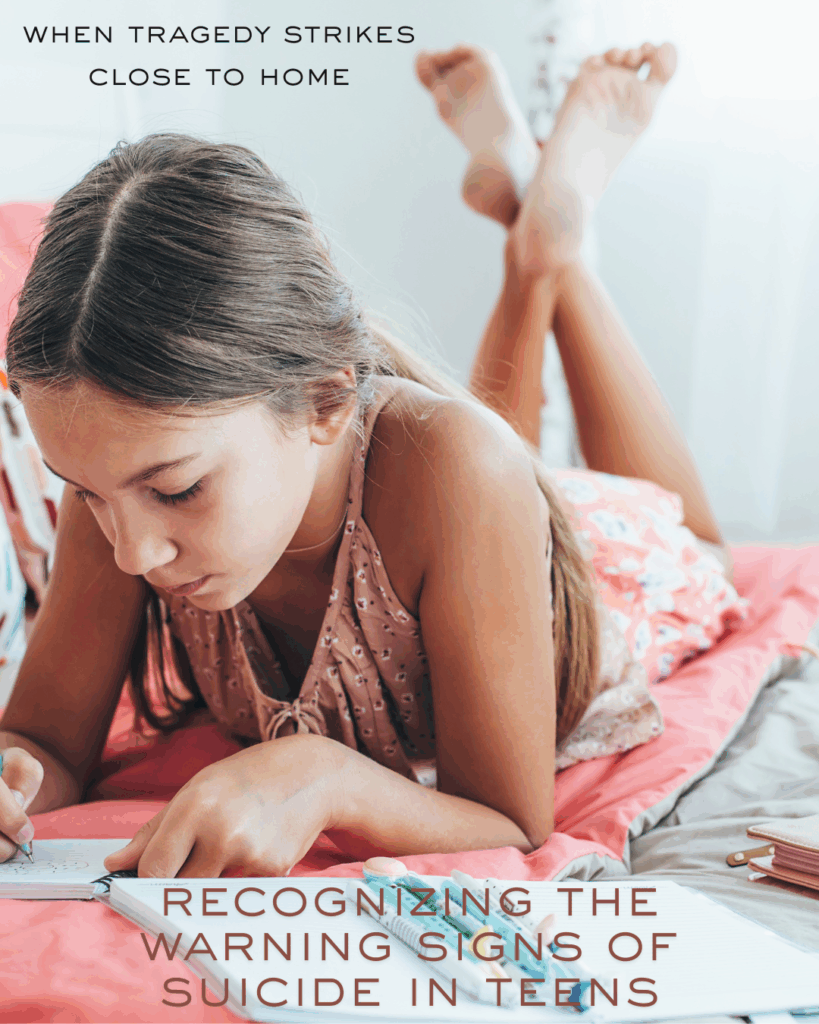VIEW my SERVICES
I look forward to learning about you
let's chat
type below and hit enter
Search the blog
Browse by topic
I'm Christina I'm passionate about women and teen girls living healthy lives!
Learn More Here
I'm so glad you're here
How To Assess Suicide Risk in Teens
October 17, 2025

How Parents Can Assess For Suicide Risk in Teens
The recent reports of teen suicides in Seminole County, Florida have shaken many parents to their core. When tragedy occurs so close to home, it forces us to face the uncomfortable: how can we tell if our teen is in danger, and what can we do? As a Licensed Mental Health Counselor who specializes in teen mental health counseling, I wanted to offer some insight on how parents can take to assess for suicide risk, how to know the difference between suicidal ideation and self-harm, and what you can do if your teen is having suicidal thoughts.
What Are the Warning Signs of Suicide and Depression in Teens?
You know, as moms we tend to believe that if something serious is wrong, we’ll see the warning signs: big mood swings, withdrawal, changes in how they act. But the hard truth is: sometimes we won’t see anything at all. Teens can mask their pain really well. They may keep up appearances at school, joke things off, or show no obvious change in behavior. They might be isolated inside, so hurt, but hiding their true feelings. Just because they seem “fine” doesn’t mean they are.
That’s why it’s so important, even if everything looks okay, to stay connected, ask gentle questions, and trust your gut if something feels off. Better to ask and be mistaken than to assume all is well and miss a quiet alarm.
Here are some things to watch that might mean more than “just teenage moodiness:”
- They talk about death, dying, or say things like “I wish I weren’t here.”
- Expressions of hopelessness: “Nothing matters,” “I can’t keep doing this.”
- Withdraws from friends, stops doing things they used to love.
- Big changes in sleep or appetite — sleeping way more (or way less), eating a lot more or less than usual.
- Grades slipping, chores not being done, things around the house or school neglected.
- Sometimes they might give things away (their favorite items), or say “goodbye” in subtle ways.
- Mood swings — perhaps super irritated, angry, or very quiet; sometimes seems “calm” after a really low point.
- Physical complaints with no medical cause (headaches, stomachaches)
- Risk-taking behavior, substance use, or access to dangerous things.
How Do I Know If It’s Self-Harm Versus Suicide Thinking?

This one’s tricky, because sometimes they overlap, and sometimes not. But understanding the difference helps you know how urgent things are.
- Self-harm (non-suicidal self-injury) is often about coping with emotional pain: maybe they cut, burn, or hurt themselves without the goal of dying. It’s a way to release pressure, feel something, punish themselves, or get relief.
- Suicidal ideation is thinking about dying, planning how to end one’s life, or believing life isn’t worth living.
Here are questions you could gently ask, to see where your teen is at:
- “When you hurt yourself, what are you hoping to get out of it? Relief? Punishment? Something else?”
- “Have you ever thought, I want to die, or that you’d be better off not being here?”
- “Have you ever made a plan, thought about how or when you might kill yourself?”
- “If whatever is hurting you eased a bit, do you think you’d still want to hurt yourself or die?”
If they admit to thinking about killing themselves, or planning something, that’s an indication that your teen needs professional mental health counseling.
What Do I Do If My Teen Tends to Exaggerate or Lie?
If your teen sometimes “goes dramatic” (we’ve all been there in their shoes), you might wonder: is this real or overblown? Here are some ways to handle it lovingly without dismissing what might be real pain.
- Always take it seriously. Even if you think it’s dramatics, treat the words as if they matter, because they do.
- Ask follow-ups in a caring way. “That sounded really hard. When you said you wished you weren’t here, what were you thinking?” “How often do you think about that?”
- Look for patterns. Is this something that’s happened more than once? Do you see mood changes, withdrawal, changes in behavior, grades, sleep, or eating?
- Be honest about your feelings. “When you say that, I feel scared and sad because I love you and want you safe.”
- Don’t shame, but set boundary of safety. You might say, “I want you to feel heard, and I want us to make a plan together so you feel safer.”
Even if your teen exaggerates sometimes, those moments often point to deeper pain. It’s always better to listen than to dismiss.
How Can I Bring Up Suicide With My Teen So It Doesn’t Push Them Away?
Talking about suicide is scary. As moms, we worry we’ll “make it worse” or “give them ideas.” But honest, caring conversations often do the opposite. Here’s how:
- Pick a time when things are calm (not in crisis) and a place that feels safe. Maybe in the car, on a walk, or after dinner.
- Start with concern and love. “Hey, I’ve noticed you seem more quiet lately / more angry / more distant / sad. I love you, and I want you to know I’m here.”
- Ask open-ended questions, gently:
- “How have you been feeling deep down lately?”
- “Do you ever feel like life is just too overwhelming?”
- “Have you ever thought maybe you’d rather not be here anymore?”
- “If you ever feel that way, would you tell me what’s going on?”
- Listen more than speak. Let them talk. Validate: “That must be so hard” / “That sounds terrifying” / “I’m so sorry you’re going through that.”
- Be okay with silence. They might not want to talk right then. You can say, “That’s okay. Whenever you want to, I’m here.”
- Know what you’ll do if they say yes. Have resources ready (therapist, counselor, crisis lines). Make a safety plan together if needed. You can find safety plans online, or contact a licensed counselor to do this with your teen.
What Questions Should I Ask to Really Figure Out Risk of Sucide ?
Sometimes small clues help you see how serious things are. These questions can help you assess:
- “Have you thought about killing yourself?”
- “Have you ever made a plan? when, where, how?”
- “Do you have access to anything you could use: pills, guns, sharp things?”
- “Have you done anything to get ready (notes, searching for methods)?”
- “Is there anything stopping you from hurting yourself right now?”
- “Who do you feel you can talk to (friends, faith, counselor, parent)?”
- “What makes you keep going? What are things you still care about or hope for?”
If their answers show planning, intent, or no perceived barriers, that’s serious and your teen will need help right away.
When Does It Become Urgent Enough to Get Professional Help Immediately?
As moms, we sometimes wait, hoping things will pass. But some signs mean we cannot wait:
- If your teen says they plan to kill themselves or they will die by suicide.
- If they’ve already taken steps like having a plan, gathering means, maybe even a note.
- If they say there’s no reason to live, or everything feels pointless.
- If they’ve had a previous attempt this is very important to know and indicates higher risk of another attempt.
- If you believe they’re in immediate danger (your intuition can be powerful).
What to do in those moments:
- Stay with them; don’t leave them alone.
- Call 911 or take them to your nearest hospital ER.
- Use the 988 Suicide & Crisis Lifeline — call, text, or chat. It is available 24/7 in Florida. MyFLFamilies+2Florida Department of Health+2
- Let them know you’re acting because you love them and believe they deserve help and safety.
Even afterwards, make sure follow-up happens: therapy, safety planning, support.
Where Can I Find Help in Lake Mary / Seminole County?
If you’re here in Seminole County (Lake Mary, Sanford, Oviedo, Winter Springs, Altamonte Springs) I provide family counseling and teen counseling both in person and online throughout the state of Florida.
- Christian-family-based counselors often blend emotional health and spiritual values- which matters if faith is part of your family life.
- Ask about availability for emergency or crisis sessions. When risk is high, waiting weeks isn’t enough.
- Resources:
- 988 Suicide & Crisis Lifeline — 24/7 support. MyFLFamilies+2Florida Department of Health+2
- Florida Department of Health – Youth Suicide Prevention pages. Florida Department of Health
- Florida Suicide Prevention Coalition — help with safety planning, local resources. Florida Suicide Prevention Coalition
What Can I Do As A Mom To Stay Close, Safe, and Supportive?
It isn’t just about the big conversations. It’s what happens in between. Here are things I encourage moms of teens to do:
- Check in often. Even just a text: “Hey, thinking about you today”.
- Build small routines of connection: dinner together, walks, game nights, car rides.
- Help them identify small coping tools: journaling, walk, music, talking with someone they trust.
- Protect the environment: remove or lock up anything dangerous like medications, weapons, sharp objects if there’s concern.
- Let them know therapy isn’t a punishment. You might join them or help find someone they like.
- Take care of yourself, too. You can’t pour from an empty cup. Having your own support (friends, mentor, counselor) gives you strength to help them.
Lake Mary Teen and Family Counseling- What You Can Do Right Now

I know this is hard. I know sometimes it feels like you’re the only one worrying, or that you’re messing up no matter what. But trust this: your caring matters. Being willing to ask the hard questions, sit in the discomfort, reach out for help.
If you’d like, I’d be honored to walk beside you. I’m Christina Milazzo, a Licensed Mental Health Counselor specializing in counseling teen and adolescent girls here in Seminole County. If you think your teen might need more support, or you just want a trusted conversation about how to safely assess risk — let’s set up a consultation. You don’t have to face this on your own.
Reach out today. Your teen deserves to feel seen, safe, and supported, and so do you.
Leave a Reply Cancel reply
I am so happy you're here! I look forward to getting to know your story and beginning the healing process.
Read more about me
I'm so glad you're here
Click here to contact me to schedule a free 10 minute consultation call.
Christian Counseling & Therapy for Women and Teens • Family Counseling Services • Infertility Counseling — serving Lake Mary, Florida and online throughout Florida.
Healing Hearts. Restoring Relationships. Rooted in Faith.
christina milazzo
© 2025 Lake Mary Florida Counselor, therapist lake mary, christian therapist lake mary, Lake Mary Christian Counseling, orlando infertility therapist, counseling for infertility, ORLANDO womens counseling